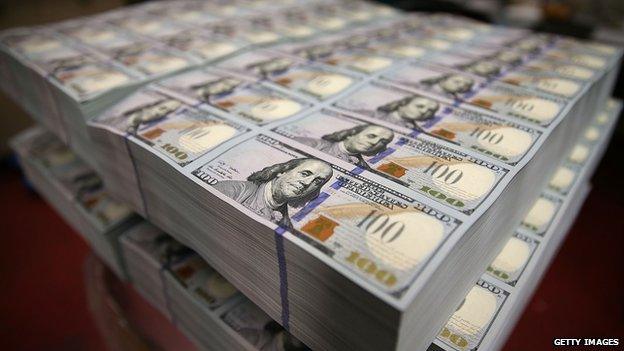Green Climate Fund seeks big bucks
- Published
- comments

One… hundred… billion dollars.
Cue an outburst of Dr Evil-like pinky chewing in the offices of the new Green Climate Fund (GCF), just opened in South Korea.
While the Austin Powers movie character threatened to destroy a major city every hour unless he was paid a large sum, the trustees of the GCF say that unless they get the aforementioned amount by 2020, developing countries won't be able to adapt to the worst impacts of climate change.
So far, they've barely got enough readies to keep the lights on in their shiny new Songdo headquarters.
Back at the ill-fated end-of-the-world-party that was the Copenhagen climate summit in 2009, the rich countries promised to deliver the 100 billion sum by 2020.
As a measure of good faith they said they would provide $10bn a year in fast-track finance, for three years, from 2011.
But so far, the fast-track seems to be made of molasses.
According to the Overseas Development Institute, new climate money in 2013 has dropped by more than two thirds since 2012.
Right now there is nothing but old buttons in the pot for 2014 - and how that translates into 100 billon by 2020 remains unclear.
Back to Dr Evil.
$100bn was also Dr Evil's desired sum of money
In Austin Powers: International Man of Mystery, the US President bursts out laughing at the demand for $100bn telling the would-be blackmailer that, in 1969, that amount of money doesn't even exist.
"That's like saying," the President goes on, "I want a kajillion, bajillion dollars."
Perhaps that's what the GCF should now ask for?
At the recent Warsaw conference of the parties, the wealthier governments refused to go along with an intermediate target of raising $70bn by 2016.
And the language in the final communiquΓ© wins a global prize for vagueness.
"Calls for ambitious and timely contributions by developed countries to enable an effective operationalization, including for readiness and preparatory support of the Green Climate Fund that reflects the needs and challenges of developing countries in addressing climate change in the context of preparing, by the twentieth session of the Conference of the Parties (December 2014), the initial resource mobilization process described in paragraph 12 above," it reads.
All the verbiage ended with a promise to bring some sort of financial figure to the table by the end of next year.
Richer countries were bluntly saying that the global recession had, for now, put paid to major outflows of public money for adaptation.
Again and again in Warsaw, ministers made the point that the rivers of cash would have to be private.
UN climate chief Christiana Figueres picked up on this theme at the opening of the new GCF headquarters in South Korea, as she highlighted the scale of the challenge facing developing nations.
"This is not only changing the tires on a moving car, it is the equivalent of learning to drive the world's fastest car, which is urgently needed but is still under development by the engineers, attempting to drive down a twisting and winding road and trying to set a speed record all at the same time," she said.
The one benefit of the global recession, said Ms Figueres, was that it had led to a global savings glut.
And still flogging the motoring metaphor for all it was worth, she said the GCF could be the GPS that "steers the vehicle of private capital".
So far, the negotiating countries have at least managed to avoid a car crash on finance. But unless the GCF gets significant contributions in the next 24 months, there won't be a global deal in Paris in 2015.
I'd bet $100bn on that.
Follow Matt .